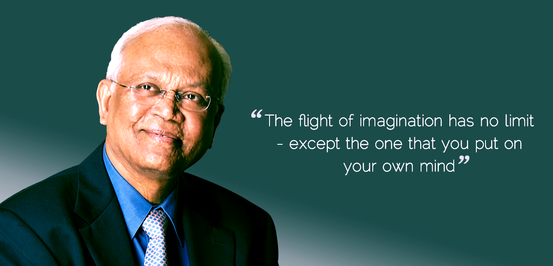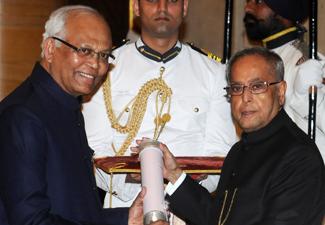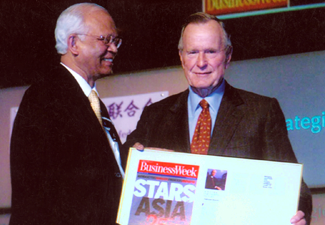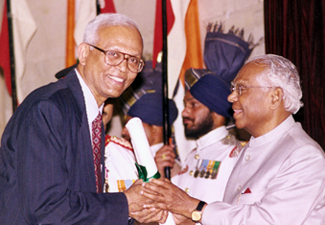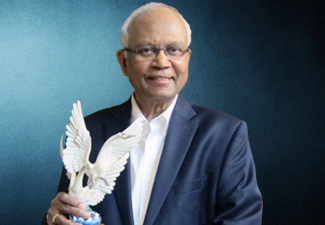Dr.R.A. Mashelkar
India's most eminent scientists. Currently the Chairman of India’s National Innovation Foundation, Reliance Innovation Council, KPIT Technologies Innovation Council, Persistent Systems Innovation Council and Marico Foundation’s Governing Council. He co-chairs the Maharashtra State Innovation Council.
|
Dr. R.A. Mashelkar - Speaker Profile
<
>
India’s most eminent scientists. Recieved In 1998, of J.R.D. Tata Corporate Leadership Award, an exclusive honour reserved for Indian Corporates. In 1998, he was also elected Fellow of Royal Society, the topmost honor reserved for world’s path breaking scientists.
Mashelkar valiantly fought and revoked the wrong US patents on turmeric and Basmati rice based on India’s traditional knowledge. But to US multinationals, he licensed patents based on modern knowledge of Indian laboratories, pioneering the trend of reverse transfer of technology. He is a Director on boards of India’s leading companies, from Tatas to Reliance. 36 global universities have bestowed honorary doctorates upon him. The Government’s trust in him shows through the twelve high-powered Mashelkar Committees, many of them on contentious issues. As its leader, Mashelkar transformed CSIR, the world’s largest chain of laboratories-heralded as one of the top ten achievements of Indian Science & Technology in the 20th century. He has received Padmavibhushan at the hands of President of India and Star of Asia at the hands of George Bush (Sr), former US President. LIFE Dr. Raghunath Anant Mashelkar is one of India’s most eminent scientists. He is known for his contributions to India’s National Chemical Laboratory and Council of Scientific & Industrial Research, multiple ‘Mashelkar Committees’, and a successful campaign against foreign patents on Indian traditional knowledge. His mantras of ‘Inclusive Innovation’, ‘More from Less for More’, and ‘Gandhian Engineering’ have been a constant source of inspiration for corporates and youth alike. Born on 1st January 1943 in Mashel, Goa, Ramesh (as he is known to his near and dear) lost his father at the tender age of six. However, his mother Late Mrs. Anjani Mashelkar was committed to doing the best she could for him. It was her determination and foresight that pushed them to move to Mumbai in search of a better livelihood and education. Here they lived in a chawl (a type of shared tenement) and often struggled to make ends meet. He went barefoot to a municipal school and would sometimes be unable to afford a notebook to write his answers in. However, he demonstrated excellence even amidst adversity. He was the brightest student in the school and continuously excelled in his academics. After successfully completing 7th grade, he was set to take admission at Union High School, Mumbai. However, his mother had a difficult time arranging for 21 rupees for the admission. The obstacle was overcome by borrowing from their maid, who believed in his potential so much that she lent her entire savings so that he could continue to excel academically! At Union High School, young Raghunath’s teacher Mr. Bhave recognized his talent and motivated him to stay focused in life, using the example of a convex lens which can concentrate the sun's rays and even spark a fire. It was this striking example that inspired Raghunath to become a scientist. He cleared his board examinations with flying colours – ranking 11th in Maharashtra – despite having studied by the light of a street lamp! Young Raghunath had a curiosity so insatiable that he would often sit outside the Majestic Bookstall in Girgaon, reading new books and quickly returning them because he had no money to buy them. After his board exam, he contemplated giving up on further education due to financial constraints. However, the encouragement by his mother and financial support from the Sir Dorabji Tata Trust helped him secure a seat in the prestigious Jai Hind College. As always, he worked hard and stood 2nd in the inter-state examinations. In fact, Jai Hind College awarded him the honour of its most distinguished alumnus in 2003. Motivated by the bright future for the chemical industry in India, he joined UDCT (Now Institute of Chemical Technology), Mumbai to pursue his bachelor’s degree in Chemical Engineering. After earning his degree, he had the option to go abroad to pursue his master’s degree with a generous scholarship. Instead, he decided to continue his work at UDCT as a postgraduate under the mentorship of Prof. MM Sharma in the area of mass transfer in chemical reactions. He went on to complete his PhD under the guidance Prof. Sharma, finishing his thesis in just three years. His outstanding work earned him a fellowship at Salford University. Here, his guide encouraged him to work in an unrelated field – rheology. Dr. Mashelkar took up the challenge and over time, he made a name for himself as a distinguished Indian researcher. In 1975, he was asked by Dr. B.D. Tilak (the then director of NCL) to meet Dr. Nayudamma (the then director general of CSIR) at London. In this meeting, Dr. Nayudamma spoke to him about India’s untapped potential for excellence in science and technology, and the scarcity of talent in this area. His words inspired Dr. Mashelkar to work in the science, technology and innovation sector of India. He put aside his personal gains – India was considered a ‘dead end’ back in those days by most – and returned to his homeland. After establishing himself at the National Chemical Laboratory(NCL) in Pune, he became its director in 1989. Under his leadership, research at NCL shifted focus to cater to the requirements of the industry. This was a revolution in itself! After India’s economy was liberalized in 1991, he oversaw the collaboration of NCL with companies in India and abroad, setting a trend which many others followed. He also played a pivotal role in transforming CSIR (Council of Scientific and Industrial Research) after he became its Director General in 1995. He strived to unify the efforts of the 40 diverse laboratories, establishing a one-team culture and improving internal collaboration, and took CSIR to new heights. Dr. Mashelkar is probably best known to the common man through his crusade against the US patents on turmeric, neem and basmati rice. Arguing that the healing properties of turmeric are well known as traditional knowledge in India, Dr. Mashelkar fought a 14 month long legal battle to revoke the patent and emerged victorious. This victory was so significant that it changed the way patents were classified, and earned him the moniker of ‘The Warrior of Haldighati’. Throughout his career, he has written 25 books, 264 research papers, and has been awarded honorary doctorates by 36 universities from India and abroad. He has also actively served the Government of India by chairing 12 highly empowered 'Mashelkar Committees', and has been a member of the Scientific Advisory Council to the Prime Minister. His contributions to the nation and to science at large have been honoured by a plethora of awards, the most significant being the Padma Vibhushan, the Padma Bhushan, the Padma Shri, the Business Week Star of Asia Award, and the Shanti Swaroop Bhatnagar Prize for Science and Technology. He is the third Indian engineer to be inducted as a Fellow of the Royal Society, UK and the first Indian to be elected as a fellow of National Academy of Inventors, US. Currently, Dr. Mashelkar is the President of the Global Research Alliance, which is the world’s largest network of publicly funded R&D institutes that work together to achieve millennium development goals. He is also the Chairperson of the National Innovation Foundation of India, which aims at promoting grassroots innovations to solve some of society’s biggest problems. He is an ambassador and evangelist for innovation and R&D across the world and serves on the boards of many leading companies. He lives in Pune, India with his family. CareerEminent scientist Dr. Raghunath Anant Mashelkar is one of twelve Indian National Research Professors at National Chemical Laboratory(NCL) and the President of Global Research Alliance. Dr. Mashelkar served as the Director General of Council of Scientific and Industrial Research (CSIR) - a network of thirty-eight laboratories with about 20,000 employees - for over eleven years. Prior to this, he was the Director of the NCL for six years. A chemical engineer from UDCT (Now Institute of Chemical Technology), Mumbai, he was also the President of Indian National Science Academy and the President of Institution of Chemical Engineers, UK. Throughout his stellar career, Dr. Mashelkar has made indelible contributions to India, inspiring millions in the process. Dr. Mashelkar has played a critical role in shaping India's science and technology policies. He was a member of the Scientific Advisory Council to the Prime Minister and also of the Scientific Advisory Committee to the Cabinet set up by successive governments. He has chaired twelve high powered committees to look into issues as diverse as overhauling the Indian drug regulatory system, reviewing the state of Regional Engineering Colleges and preparing a National Auto Fuels Policy. As an expert in restructuring public R&D institutions, he has made contributions across the world – from South Africa to Croatia. When Dr. Mashelkar took over as the Director General of CSIR, he enunciated 'CSIR 2001: Vision & Strategy'. This was a bold – and the first ever – attempt to draw out a corporate - like R&D and business plan for a publicly funded R&D institution. This initiative transformed CSIR into a user focused, performance driven and accountable organization. This process of transformation has been hailed as one of the ten most significant achievements of Indian Science and Technology in the twentieth century. It was through his sustained and visionary campaign that awareness of Intellectual Property Rights (IPR) has grown amongst Indian academics, researchers and corporates. He spearheaded the successful challenge to a US patent on the use of turmeric for wound healing,as well as another patent on Basmati rice. These landmark cases have set up new paradigms in the protection of India's traditional knowledge base, besides leading to the setting up of India's first Traditional Knowledge Digital Library. In turn, at an international level, this has led to the initiation of the change of the International Patent Classification System to give traditional knowledge its rightful place. As Chairman of the Standing Committee on Information Technology of the World Intellectual Property Organization (WIPO); as a member of the International Intellectual Property Rights Commission of UK; and as Vice Chairman on Commission in Intellectual Property Rights, Innovation and Public Health (CIPIH) set up by World Health Organization (WHO); he brought the perspective of developing nations into IP right discussions. Still deeply connected with the innovation movement in India, Dr. Mashelkar is currently the Chairman of India’s National Innovation Foundation, Reliance Innovation Council, Marico Innovation Foundation and Thermax Innovation Council. He pioneered and spread the message of 'Gandhian Engineering', 'More from Less for More people' and ‘Affordable Excellence’. He has been tirelessly propagating a culture of innovation and balanced intellectual property rights regime in India for over a decade. The President of India honoured Dr. Mashelkar with Padma Vibhushan (2014), Padmabhushan (2000) and Padmashri (1991), three of the highest civilian honours, in recognition of his contribution to nation building. In fact, he has received accolades from across the world. Dr. Mashelkar is only the third Indian engineer to have been elected (1998) as Fellow of Royal Society (FRS), UK in the twentieth century. He is the first Indian to be elected (2017) as a fellow of National Academy of Inventors (NAI), US. In addition, he was elected Foreign Associate of National Academy of Science (USA) in 2005; Associate Foreign Member, American Academy of Arts & Sciences (2011); Foreign Fellow of US National Academy of Engineering (2003); Fellow of Royal Academy of Engineering, UK (1996); Foreign Fellow of Australian Technological Science and Engineering Academy (2008); and Fellow of World Academy of Art & Science, USA (2000). In August 1997, Business India named Dr. Mashelkar among the 50 path-breakers in post - independent India. In 1998, Dr. Mashelkar became the first scientist to win the JRD Tata Corporate Leadership Award. On 16 November 2005, he received the Business Week (USA) award of ‘Stars of Asia’ at the hands of George Bush (Sr.), the former President of USA. He was the first Asian Scientist to receive it. Thirty seven universities have honoured him with honorary doctorates, which includes Universities of London, Salford, Pretoria, Wisconsin and Delhi. Dr. Mashelkar has won over 50 awards and medals, which include S.S. Bhatnagar Prize (1982); Pandit Jawaharlal Nehru Technology Award (1991); G.D. Birla Scientific Research Award (1993); Material Scientist of Year Award (2000); IMC Juran Quality Medal (2002); HRD Excellence Award (2002); Lal Bahadur Shastri National Award for Excellence in Public Administration and Management Sciences (2002); World Federation of Engineering Organizations (WFEO) Medal of Engineering Excellence, Paris (2003); Lifetime Achievement Award by Indian Science Congress (2004); the Science Medal by the Academy of Science for the Developing World (2005); Ashutosh Mookherjee Memorial Award by Indian Science Congress (2005); many more. Dr. Mashelkar is on the Board of Directors of several reputed companies such as Reliance Industries Ltd., Tata Motors Ltd., Hindustan Unilever Ltd., GeneMedix Life Sciences Ltd., Indigene Pharmaceuticals Ltd., ICICI Knowledge Park, Thermax Ltd., Piramal Life Sciences Ltd., and KPIT Cummins Infosystems Ltd. He is a member of the Scientific Advisory Board of Microsoft. Through various formal initiatives and informal efforts, Dr. Mashelkar continues to champion the cause of developing nations and underprivileged people everywhere. AWARDS & RECOGNITIONSSpeechesKeynote Addresses
|

